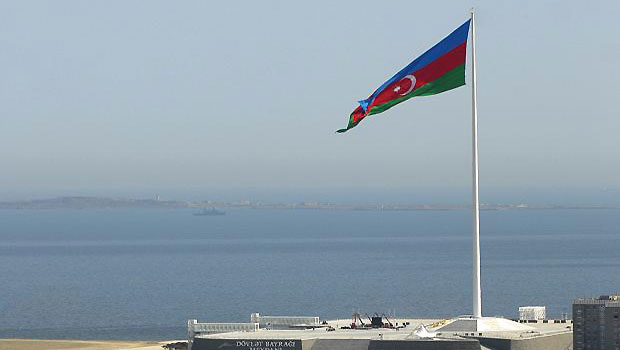By all accounts Azerbaijan should be Iran’s closest ally.
The tiny republic on the Caspian Sea is home to nine million people with strong ethnic, historic, and religious ties to the Iranian people. Almost 80 percent speak Azeri, an Altaic language with a vocabulary drawn from Turkish, Persian, and Arabic. Around 12 million people in five Iranian provinces speak a version of the language.
Azerbaijan also contains Kurdish, Gushtasbi-Talysh, Tat, and Lezgin minorities; ethnic groups with kith and kin in Iran (ethnic and linguistic minorities account for 22 percent of Azerbaijan’s population).
Known as Aran, Shiravan and Nakhjivan, the areas that actually form Azerbaijan were part of the Iranian heartland for more than 25 centuries. Iran lost them in two disastrous wars with Tsarist Russia which was pursuing its dream of reaching warm waters through Iran. With treaties imposed on the Qajar Shahs in 1824 and 1830 Iran ceded the areas to the Tsars.
When the Tsarist Empire collapsed following the 1917-1918 Russian Revolution, these areas came together to form an independent state. The experiment lasted two years before Lenin sent an army of to reassert Russian domination. Next, Josef Stalin, acting as Commissar for Nationalities, transformed the territories into a new unit named Azerbaijan, establishing it as an autonomous republic within the USSR. The fall of the Soviet Empire in 1991 gave the people of Azerbaijan a chance to regain their independence.
Due to these events, large numbers fled from the affected territories, seeking refuge in Iran. Today there are millions of Iranians whose ancestors fled the Tsarists and the Bolsheviks. The flow of refugees to Iran from Azerbaijan continued for decades, albeit with varying intensity. In the 1990s as Armenia invaded and annexed Nagorno-Karabakh, half a million people fled from Azerbaijan to Iran.
With Shi’ite Muslims representing some 85 percent of the population, Azerbaijan also shares strong religious ties with Iran. Linguistically, the Kurdish, Tat, and Gushtasbi-Talysh minorities belong to the family of Iranic languages. (Iran’s Zoroastrian “holy” book Avesta was originally written in the Gushtasbi-Talysh language.)
Thus, relations between Azerbaijan and Iran should be at least correct if not cordial. And, yet, the opposite is the case.
Last week, Iran recalled its ambassador from Baku, capital of Azerbaijan, and closed border passages.
The move came after Azerbaijan arrested 41 people on charges of espionage for Iran. Azerbaijani journalist Anar Bayramli, who worked for Iranian media, was also arrested.
As the drama unfolded, two Azerbaijani writers Farid Hussein and Shahriar Haji-Zadeh disappeared in Iran, presumably seized as hostages.
Last week, Tehran’s anger rose when Baku hosted a conference on “The Future of Southern Azerbaijan”. This was a gathering of militants, mostly US citizens of Iranian origin, who regard all the various peoples who speak versions of the Azeri language as Turks. It is not quite clear what they mean by “South Azerbaijan”. But one must assume that they want Azerbaijan to merge with the five Iranian provinces where Azeri is widely spoken to form a single new nation of 22 million people.
Tehran sees the move as a plot hatched by the United States, Israel, and Turkey against Iran’s territorial integrity.
However, the “unification” plan would mean the disappearance of the Republic of Azerbaijan in its present shape. In a “greater” Azerbaijan the people of the republic would become a minority.
Not surprisingly, on Wednesday the daily Kayhan, reflecting the views of “Supreme Guide” Ali Khamenei called for the “return” of Azerbaijan to Iran. It suggested that a referendum be held under international auspices on the subject, giving the people of Azerbaijan the choice of “returning to their Iranian homeland.”
Hosting secessionists is not the only reason for Tehran’s anger. Azerbaijan has close ties with Israel including a USD 1.6 billion contract to purchase arms from the Jewish state. Tehran media claim that Azerbaijan would give Israel bases to bomb Iran’s nuclear sites.
Iran also regards Azerbaijan’s ties wit Turkey, a member of NATO, as a potential threat in case of a military clash with the United States.
To add to Tehran’s anger, Azerbaijan has sided with Russia over dividing the resources of the Caspian Sea including oil and gas and caviar-bearing fish reserves.
Iran wants the Caspian to be declared an inland sea jointly owned by its five littoral states. Under that scheme, Iran’s share would be 20 percent. Russia and Kazakhstan want the sea divided according to the length of each littoral state’s shoreline. Under this scheme, Iran would end up with 11 percent. At first equivocating on the issue, Azerbaijan now tilts towards the Russian position while Turkmenistan, the fifth littoral state, is hedging its bet.
Azerbaijan, too, has complaints against Iran.
The Islamic Republic supports Christian Armenia in its conflict with Azerbaijan. Without support from Iran, landlocked Armenia would not have been able to annex Nagorno-Karabakh. It is clear that as long as Iran backs Armenia, Azerbaijan will not be able to recapture its lost territories.
Baku has another complaint.
Iran’s ruling mullahs try to incite Azerbaijan’s Gushtasbi-Talysh minority against the Azeri majority despite the fact that the majority of the Gushtasbi-Talysh are Sunni Muslims. Baku also accuses Tehran of trying to foment nationalism among Kurdish, Tat and Lezgins in Azerbaijan.
Tehran’s mishandling of relations with Azerbaijan is a classic example of how ideological blindness could turn a nation’s potentially closest neighbor into an enemy.
Blinded by its anti-Americanism, the Khomeinist regime not only ignores deep-rooted cultural and historical ties but has also set aside Islamic or even Shi’ite sensibilities in shaping relations with Azerbaijan.
Instead of the current tension, under a normal regime Iran would have been able to draw Azerbaijan close to its ancestral cultural and historic homeland by opening the borders, merging markets, and allowing maximum contact between populations on both sides of the Aras River.
Sadly, however, tension with Azerbaijan need not be surprising. Today, Iran’s relations with all its neighbors are marked by varying degrees of mistrust and hostility. A sad story, all round.
